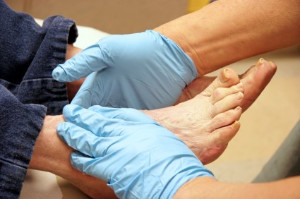
When a person has diabetes, it is important to have annual foot checks, which might include vascular and possibly other testing of the feet. Neuropathy is a common complication of diabetes that interferes with feeling in the feet. This can lead to undetected foot sores or ulcers that are left untreated and can lead to foot amputation. A qualified podiatrist will palpate the Dorsal Pedis and Posterior Tibial arteries looking for pulses, review the skin quality, and check capillaries. Things like hair loss, thin, smooth, shiny skin, thick, brittle nails, and tapering toes are noted as they might indicate changes in artery function. Fissuring, particularly in the heels and oedema are checked as these may indicate “ischaemia” or buildup or blockage in the arteries. Diabetics can take action to protect their feet from vascular issues by wearing properly fitting shoes and socks, regular exercise, taking medications as prescribed, and weight management. Regular visits to a podiatrist should be scheduled to stay on top of foot health of diabetics.
Vascular testing plays an important part in diagnosing disease like peripheral artery disease. If you have symptoms of peripheral artery disease, or diabetes, consult with one of our podiatrists from Princeton Foot and Ankle Associates. Our doctors will assess your condition and provide you with quality foot and ankle treatment.
What Is Vascular Testing?
Vascular testing checks for how well blood circulation is in the veins and arteries. This is most often done to determine and treat a patient for peripheral artery disease (PAD), stroke, and aneurysms. Podiatrists utilize vascular testing when a patient has symptoms of PAD or if they believe they might. If a patient has diabetes, a podiatrist may determine a vascular test to be prudent to check for poor blood circulation.
How Is it Conducted?
Most forms of vascular testing are non-invasive. Podiatrists will first conduct a visual inspection for any wounds, discoloration, and any abnormal signs prior to a vascular test.
The most common tests include:
- Ankle-Brachial Index (ABI) examination
- Doppler examination
- Pedal pulses
These tests are safe, painless, and easy to do. Once finished, the podiatrist can then provide a diagnosis and the best course for treatment.
If you have any questions, please feel free to contact our offices located in Princeton, and West Windsor, NJ . We offer the newest diagnostic and treatment technologies for all your foot care needs.
